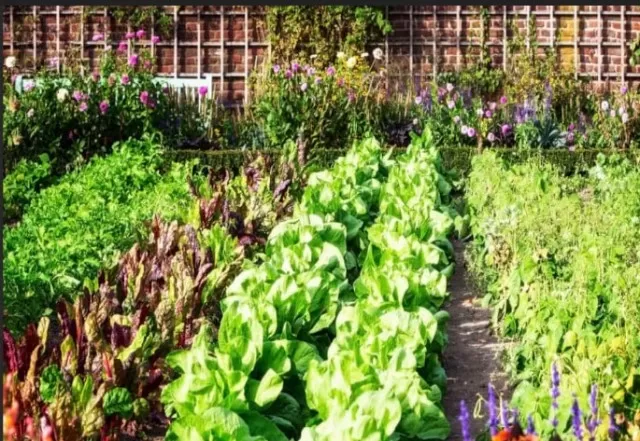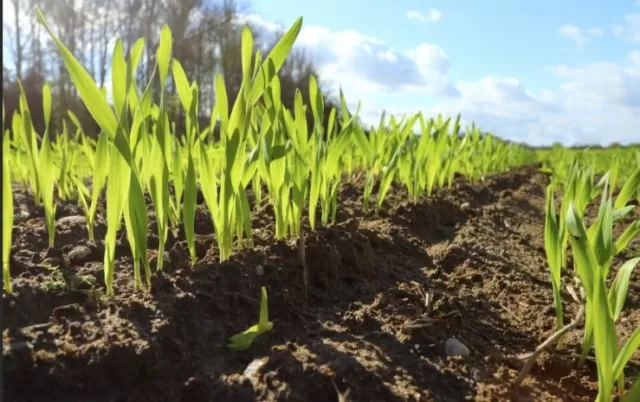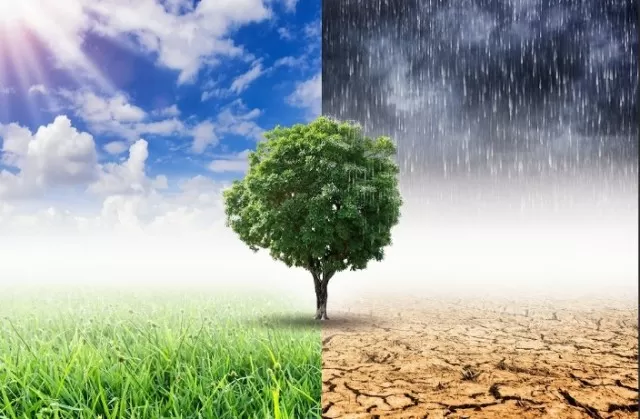Garden Strategies to Combat Climate Change. No matter the size of your outdoor space, be it multiple acres, a small postage stamp-sized yard, or even just a container garden on your balcony, creating a victory garden can have significant positive impacts on the environment.
Victory gardens, historically popular during times of war and scarcity, are now making a resurgence as a sustainable and eco-friendly practice. By growing your own fruits, vegetables, and herbs, you contribute to various environmental benefitsNo matter the size of your space, starting a victory garden is an eco-friendly step toward a more sustainable and resilient future. Whether you have an expansive backyard or a tiny urban balcony, you can make a positive impact on the environment by growing your own produce and embracing a greener way of living. So, pick up your shovel and seeds, and let your victory garden journey begin!
Cultivating Resilience: Climate Victory Gardens Flourish Amidst Global Challenges

Amidst the pressing issues of a climate change emergency and a lingering global pandemic, the concept of Climate Victory Gardens has emerged as a powerful and accessible means for individuals to make a tangible difference.
By nurturing plants from seed to sustenance, people have found solace in contributing to efforts that might otherwise feel beyond their grasp. However, the idea of gardening during times of hardship is not a novel one; it bears striking resemblance to the historical wartime gardens, aptly termed victory gardens, fostered during World Wars I and II.
In the wake of the 2020 pandemic lockdowns, a remarkable surge in interest for home gardening became evident as seed sellers and garden stores faced a rapid depletion of their supplies.
The overwhelming desire to grow food at home spurred a frenzy of purchases, leading some vendors to halt new orders, recruit extra staff, or encounter shipping delays. Witnessing this fervor, victory gardens have once again found their place in the yards of households across North America.
People are increasingly drawn to the idea of cultivating their own sustenance, driven not only by concerns about food insecurity but also by the growing awareness of the devastating impacts of climate change.
As the climate crisis intensifies and its consequences become ever more apparent, Climate Victory Gardens offer a beacon of hope and empowerment.
They stand as a testament to humanity’s ability to adapt and overcome adversity through sustainable practices. Not only do these gardens provide a source of nourishment and food security, but they also serve as a potent symbol of unity and collective action in the face of seemingly insurmountable challenges.
With each seed sown and each harvest reaped, Climate Victory Gardens become a small but significant contribution to a larger global effort to combat climate change and promote environmental stewardship.
As individuals cultivate their own patches of green amidst a changing world, a sense of interconnectedness with nature blossoms, fostering a deeper understanding of the delicate balance between human existence and the planet we call home.
As we move forward into an uncertain future, the revival of victory gardens in the 21st century stands as a testament to the enduring human spirit—a reminder that even in the most trying of times, we can find strength and hope in the simple act of nurturing a seed into a bountiful plant.
Climate Victory Gardens are not just a response to crises; they are a profound manifestation of humanity’s ability to adapt, heal, and thrive in harmony with nature.
Cultivate Nutritious Delights: Embrace the Joys of Growing Edibles
Embracing the art of growing edibles in your own yard is an unparalleled expression of “locally grown produce.
” With this rewarding practice, you not only savor the freshest flavors but also embark on a journey of self-sufficiency that can significantly reduce your grocery bills. The abundance of in-season vegetables at your fingertips ensures a constant and wholesome supply of nourishment for your family.
Engaging in the process of nurturing a garden instills a profound appreciation for the origins of your food.
Witnessing the tender shoots sprout and the fruits of your labor flourish, you develop a deep connection with the earth and the natural cycles of life. This intimate connection fosters a sense of stewardship and respect for the environment, making the act of eating all the more gratifying.
Beyond the personal benefits, growing your own food contributes to broader environmental sustainability efforts.
Choosing local produce over imported goods significantly reduces fuel consumption, thereby lowering greenhouse gas emissions and lessening your carbon footprint. As you cultivate your garden, you become an eco-conscious participant in the fight against climate change.
While it may not be feasible to fulfill all your food needs solely through your garden, especially if you are new to gardening, there are creative solutions to enjoy a diverse array of fresh fruits and vegetables.
Forming a gardening community with like-minded friends and neighbors presents an excellent opportunity to share the collective harvests. Each member can specialize in growing different varieties, creating a vibrant exchange of homegrown produce that enriches the lives of all participants.
Embarking on the journey of growing edibles opens a world of delight, learning, and camaraderie.
It brings you closer to the land, nourishing not only your body but also your soul. So, grab your gardening tools, gather your friends, and step into the realm of homegrown goodness—where the pleasures of nature and the joys of community intertwine to create a tapestry of sustainability and abundance.
Preserve and Nourish: The Power of Covering Your Garden Soil

Maintaining optimal moisture levels in your garden soil is the key to fostering thriving plant growth, especially during peak gardening months when water demands soar.
However, fret not, for there are ingenious and sustainable methods that can significantly alleviate the strain on your water bills while nurturing your plants and the environment.
One of the most effective techniques is covering your soil with either mulch or cover crops.
Embracing these practices goes beyond mere water conservation; they bestow an array of benefits upon your garden and the ecosystem it inhabits.
Mulching serves as a protective blanket for the soil, sealing in precious moisture and reducing evaporation.
By doing so, it minimizes the need for frequent watering, leading to considerable savings on your water bills. Additionally, this moisture-retention prowess ensures that your plants receive a consistent and nourishing water supply, promoting healthier and more robust growth.
A noteworthy advantage of mulching is its natural weed-suppressing ability.
By forming a barrier between the soil and the sun, mulch prevents weed seeds from germinating and thriving. Consequently, you can bid farewell to the constant battle against pesky weeds, allowing your plants to bask undisturbed in their nourishing habitat.
Furthermore, the application of cover crops is another powerful ally in the quest for sustainable gardening.
Planting cover crops shields the soil from erosive forces, safeguarding it from the detrimental effects of erosion. As soil erosion can lead to nutrient depletion and decreased water-holding capacity, preserving this precious resource becomes crucial for a flourishing garden.
Cover crops not only hold the soil firmly in place but also contribute essential nutrients when they are eventually incorporated into the earth.
As they decompose, these crops enrich the soil, fostering a fertile environment for future plantings. Moreover, the lush green cover crops create a harmonious symbiosis with the garden, supporting biodiversity and enhancing the overall health of the ecosystem.
In conclusion, covering your garden soil with mulch or planting cover crops is a simple yet immensely powerful practice with far-reaching benefits.
Embracing these techniques not only conserves water and reduces the burden on your finances but also nurtures your plants, minimizes weed woes, and fortifies the very foundation of your garden—the soil. So, let your garden thrive under the nurturing embrace of natural cover, as you pave the way towards a sustainable and flourishing oasis of green.
Harnessing the Nutritional Goldmine: Unleashing the Power of Homegrown Compost
Within the confines of your home, a transformative alchemy is at play, quietly brewing one of nature’s most potent fertilizers – compost.
Though it demands time and patience, the rewards it yields are bountiful, not only for your garden but also for the environment.
Crafting your Own Compost is a remarkably simple yet powerful process.
By gathering kitchen waste and scraps, you divert a significant portion of your trash away from overcrowded landfills, contributing to a more sustainable world. Instead, these organic remnants find a new purpose as they decompose into a nutrient-rich elixir for your soil.
Once the compost reaches its prime, you’re armed with a formidable arsenal of free, organic nourishment for your garden.
The dark, crumbly matter packs a nutritional punch that enlivens the soil, creating a flourishing habitat for your beloved plants. In the realm of fertilizers, nothing quite matches the magic of compost – an all-natural solution that stands in stark contrast to synthetic alternatives.
As you enrich your soil with compost, a hidden symphony of beneficial soil microbes awakens, dancing to the rhythm of renewed life.
These tiny but mighty allies work tirelessly to improve the overall health and structure of the soil, enhancing its water-holding capacity and nutrient-retaining abilities. With such a fertile foundation beneath them, your plants thrive, producing nutrient-dense and flavorsome food.
The beauty of compost lies not only in its ability to bolster plant growth but also in its ability to restore the balance of nature.
This cyclical process of composting and using compost creates a harmonious loop, wherein waste transforms into sustenance, and the cycle of life continues.
So, with a humble heap of kitchen scraps, you hold the key to a greener, more vibrant world.
By embracing the art of composting, you embark on a journey of stewardship, tending to the well-being of both your garden and the planet. As you witness the transformative power of compost, you become a guardian of the earth, nurturing the soil and reaping the rewards of nutrient-rich produce – a testament to the magic that emerges when we work hand in hand with nature.
Embrace Nature\’s Embrace: The Delights of Eco-Friendly Gardening

Amidst the vibrant hues of your garden, lies a world of harmony where nature’s wisdom takes center stage.
Embrace the beauty of going au naturel – not in the sense of naked gardening, but in nurturing your green haven without the use of harsh pesticides and synthetic fertilizers. Instead, let the wonders of nature guide your way, fostering a thriving ecosystem that benefits both your garden and the planet.
The cornerstone of this eco-friendly approach is compost – the lifeblood of a flourishing garden.
As you nourish your soil with this nutrient-rich treasure, you unlock a wealth of benefits. The essence of organic matter replenishes the earth, breathing new life into tired soil and bolstering its fertility.
In doing so, you eschew the harmful effects of man-made chemicals and synthetic agents, safeguarding the delicate balance of your garden’s microcosm.
Opting for organic pest control solutions and companion planting techniques further enhances this sustainable journey.
Rather than resorting to harsh pesticides, you welcome nature’s allies into your garden, allowing them to fulfill their roles as natural defenders against pests and diseases. In this harmonious tapestry, beneficial insects, birds, and other organisms form an intricate web of protection, maintaining the delicate equilibrium of your green sanctuary.
The magic of companion planting weaves its own enchantment, as certain plants are strategically placed to deter pests or attract beneficial insects.
Nature’s age-old wisdom shines through in this intricate dance of coexistence, showcasing the brilliance of biodiversity and interdependence in your garden.
By making these conscious and wholesome choices, you extend your care beyond the boundaries of your garden.
The ripple effect of your eco-friendly practices leads to reduced runoff pollution, preserving the purity of our waterways and ecosystems. Moreover, the fruits and vegetables borne from this nurturing embrace are not only safer but also healthier to consume, free from harmful residues that mar their natural goodness.
In the pursuit of going au naturel, you embark on a journey of sustainability, weaving your story into the broader narrative of environmental stewardship.
Your garden becomes a sanctuary of life, a testament to the beauty of coexisting with nature in harmony. So, as you tread lightly upon the earth, let the wonders of eco-friendly gardening fill your days with the marvels of nature’s embrace.
*The information is for reference only.